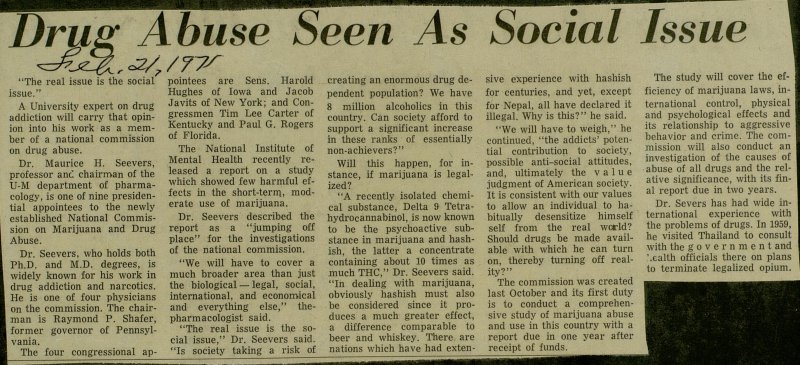Drug Abuse Seen As Social Issue

"The real issue is the social issue." A University expert on drug addiction will carry that opinion into his work as a member of a national commission on drug abuse. Dr. Maurice H. Seevers, professor and chairman of the U-M department of pharmacology, is one of nine presidential appointees to the newly established National Commission on Marijuana and Drug Abuse. Dr. Seevers, who holds both Ph.D. and M.D. degrees, is widely known for his work in drug addiction and narcotics. He is one of four physicians on the commission. The chairman is Raymond P. Shafer, former governor of Pennsylvania. The four congressional appointees are Sens. Harold Hughes of Iowa and Jacob Javits of New York; and Congressmen Tim Lee Carter of Kentucky and Paul G. Rogers of Florida. The National Institute of Mental Health recently released a report on a study which showed few harmful effects in the short-term, moderate use of marijuana. Dr. Seevers described the report as a "jumping off place" for the investigations of the national commission. "We will have to cover a much broader area than just the biological - legal, social, international, and economical and everything else," the pharmacologist said. "The real issue is the social issue," Dr. Seevers said. "Is society taking a risk of creating an enormous drug dependent population? We have 8 million alcoholics in this country. Can society afford to support a significant increase in these ranks of essentially non-achievers?" Will this happen, for instance, if marijuana is legalized? "A recently isolated chemical substance, Delta 9 Tetrahydrocannabinol, is now known to be the psychoactive substance in marijuana and hashish, the latter a concéntrate containing about 10 times as much THC," Dr. Seevers said. "In dealing with marijuana, obviously hashish must also be considered since it produces a much greater effect, a difference comparable to beer and whiskey. There are nations which have had extensive experience with hashish for centuries, and yet, except for Nepal, all have declared it illegal. Why is this?" he said. "We will have to weigh," he continued, "the addicts' potential contribution to society, possible anti-social attitudes, and, ultimately the value judgment of American society. It is consistent with our values to allow an individual to habitually desensitize himself self from the real world? Should drugs be made available with which he can turn on, thereby turning off reality?" The commission was created last October and its first duty is to conduct a comprehensive study of marijuana abuse and use in this country with a report due in one year after receipt of funds. The study will cover the efficiency of marijuana laws, international control, physical and psychological effects and its relationship to aggressive behavior and crime. The commission will also conduct an investigation of the causes of abuse of all drugs and the relative significance, with its final report due in two years. Dr. Severs has had wide international experience with the problems of drugs. In 1959, he visited Thailand to consult with the government and health officials there on plans to terminate legalized opium.
Article
Subjects
University of Michigan - Faculty & Staff
Statistics
Research
National Institute of Mental Health
National Commission on Marijuana and Drug Abuse
Marijuana laws
Marijuana
Laws & Legislation
Drugs
Drug Use
Drug Abuse
Ann Arbor News
Old News
Tim Lee Carter
Raymond P. Shafer
Paul G. Rogers
Jacob Javits
Harold Hughes
Dr. Maurice H. Seevers